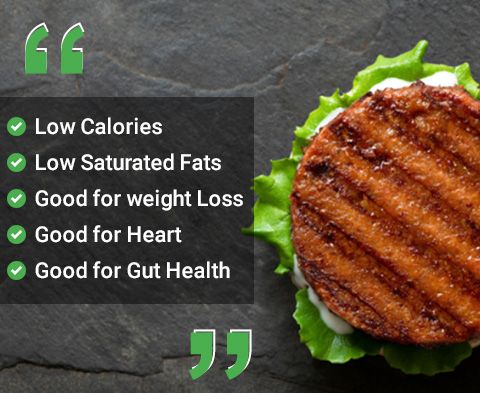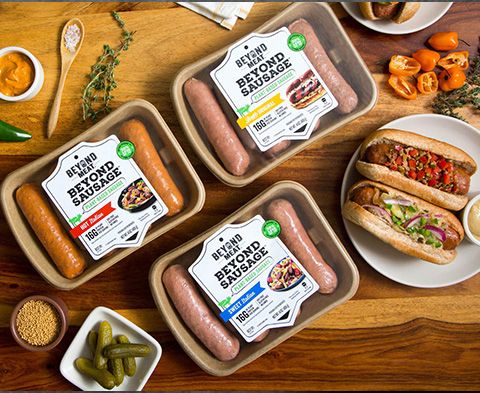Plant-based meat or fake meat has been gaining popularity in the market recently for its similar taste and nutritional value to red meat.
But what plant-based meat is and what is the criteria to choose a Healthy One?
Plant-based meat is a innovation for those who are strictly vegan or vegetarian or don’t consume meat for cultural or health reasons.
It is now being served in many restaurants in India and is also available in supermarkets in the form of plant-based chicken burgers, chicken nuggets, chicken sausages, minced chicken, kebabs, burger patties, and even biryani.
The other keywords used are - meat alternative, meat substitute, meat-free, plant-based, vegan, and vegetarian.
All plant-based meats are generally processed and commercially manufactured to support the vegetarian population. And in a country like India where the majority population is flexitarian i.e. follow a vegetarian diet most of the time and has eaten a non-vegetarian diet occasionally and taking into account the ethical reasons as well, plant-based products have tremendous scope for growth in the future.
Plant-based meat typically contains whole or a mixture of the following plant ingredients:
- Wheat gluten or seitan
- Soy and Tofu
- Pea protein
- Potato Starch
- Coconut oil
- Beans and lentils
- Nuts and Seeds
- Vegetables
Is Plant-based meat healthy?
In the same way as plants, plant-based meat also supports weight loss and improves diabetes, hypertension, heart conditions, and even some cancers.1
These are lower in calories compared to animal meat varieties. However, they are high in carbohydrates, sugars, and dietary fiber.
Total fats and saturated fats are also low in plant-based meat as compared to animal meat. So they can boost your health by lowering the risk of other health conditions.

The only drawback is the high sodium content in plant-based meats. It is reported that the Sodium content in plant-based meat is approximately six times higher than the sodium content in minced animal meat but lower than in processed animal meat. This flaw can also be removed with a sensible selection of processed food items.
The American Heart Association (AHA) also recommends consuming more plant-based diet instead of animal meat to improve heart health.3
Can Plant-based meat replace animal meat?
Plant-based meats typically provide vitamin C, E, magnesium folate, manganese, thiamin, potassium, and many antioxidants which are required for the healthy functioning of the body.
On the contrary, animal meat exclusively provides vitamins A, B12, D, K2, minerals such as iron and zinc, and polyunsaturated fatty acids or healthy fats. The plant-based diet is deficient in these minerals and vitamins. Though some manufacturers add these nutrients to their plant-based meat products while processing. Despite that, you may have to rely on supplements for the fulfillment of these nutrients.2
Moreover, plant proteins often have low protein content (ranging from 0.4 to 0.9) than animal proteins (> 0.9).
How to choose a lump of healthy plant-based meat?

In comparison to similar animal meat products, plant-based meat substitutes are a healthy option. However, some guidance is required on what to look for while shopping for plant-based meat.
Here is the list of things that you should take care of while buying a plant-based meat product:
- Must include whole foods, such as beans, legumes, vegetables, grains, seeds, and nuts
- Low in saturated fats (less than 10% of calories)
- Low in sodium
- Added vitamins A, B12, D , K2, iron, and zinc
- Protein-rich ingredients
To be precise follow this check list for ingredients in healthy plant based meat:
|
Nutrients |
Source |
|
Carbs and Sugar
|
Potatoes, corn starch, potato starch ,rice flour, sweet potato, sugar, fructose, apple, tomato paste, tapioca ,wheat flour |
|
Saturated fats |
Vegetable oil, canola oil, sunflower oil, sunflower kernels, rice bran oil, coconut oil, flax seed meal, cocoa butter, peanuts |
|
Proteins |
Soy protein, pea protein, soy beans, hydrolysed vegetable protein, mycoprotein, almonds |
|
Dietary Fiber |
Brown rice, lentils, black beans, wheat fibre, chickpeas, quinoa, red lentil, locust bean gum, buckwheat, adzuki bean, split peas, green peas, whole pear millet, soy fibre, bamboo, methylcellulose, mushrooms, mung beans, carrot, pumpkin |
|
Minerals |
Zinc, Iron |
|
Vitamins |
B12 |
|
Other ingredients |
soy leghemoglobin, red-colored vegetable extracts |
A close look at the ingredients convinces having plant-based meat over processed meat. The plant-based ingredients in a processed form better fit into a healthy diet when consumed in moderation with a proper meal plan.
Now get your Smart AI Health plan customized with DrTrust360 for a vegan or vegetarian diet with sensible portions of plant-based meats.










